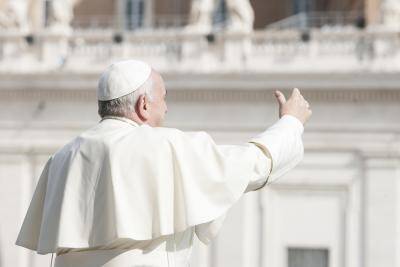January 26
Santa Marta
The primary and indispensable role of women in transmitting the faith to new generations: this was the focus of Pope Francis’ remarks to the faithful following the readings of the day at Mass on Monday morning in the chapel of the Santa Marta residence in the Vatican. On the day when the Church celebrates the memory of Saints Timothy and Titus – bishops and disciples of St Paul the Apostle, Pope Francis commented in particular on the second letter of Paul to Timothy.
Mothers and Grandmothers transmit the faith
Paul reminds Timothy of where his “sincere faith” comes from: his faith comes from the Holy Spirit, “through his mother and grandmother.” Pope Francis went on to say, “Mothers and grandmothers are the ones who [in primis] transmit the faith.” The Holy Father went on to say:
It is one thing to pass on the faith, and another to teach the matters of faith. Faith is a gift: it is not possible to study Faith. We study the things of faith, yes, to understand it better, but with study [alone] one never comes to Faith. Faith is a gift of the Holy Spirit, which surpasses all [“academic”] formation.
Faith, moreover, is a gift that passes from generation to generation, through the “beautiful work of mothers and grandmothers, the fine work of the women who play those roles,” in a family, “whether they be maids or aunts,” who transmit the faith:
It occurs to me: why is it mainly women, who to pass on the faith? Simply because the one who brought us Jesus is a woman. It is the path chosen by Jesus. He wanted to have a mother: the gift of faith comes to us through women, as Jesus came to us through Mary.
Cherish the gift of faith because you waters down
“We need,” said Pope Francis, “in our own day to consider whether women really are aware of the duty they have to transmit the faith.” Paul invites Timothy to guard the Faith, the deposit of Faith, avoiding “empty pagan chatter, empty chatter of the world.” He went on to say, “We have – all of us – received the gift of faith: we have to keep it, at least in order that it not become watered down, so that it remains strong, with the power of the Holy Spirit who gave it to us.” We keep the faith by cherishing and nurturing it every day:
If we do not have this care, every day, to revive this gift of God which is Faith, but rather let faith weaken, become diluted, Faith ends up being a culture: ‘Yes, but, yes, yes, I am a Christian, yes yes,’ – a mere culture – or a gnosis, [specialized kind of] knowledge: ‘Yes, I know well all the matters of Faith, I know the catechism’. But how do you live your faith? This, then, is the importance of reviving every day this gift: to bring it to life.
Timidity and shame they do not increase the faith
Saint Paul says that there are two things in particular, which contrast with a living Faith: “the spirits of timidity and of shame”:
God has not given us a spirit of timidity. The spirit of timidity goes against the gift of faith: it does not let faith grow, advance, be great. Shame, in turn, is the following sin, [which says]: ‘Yes, I have Faith, but I cover it up, that it not be seen too much’. It’s a little bit here, a little bit there – it is, as our forebears called it, a “rosewater” Faith – because I am ashamed to live it powerfully. No: this is not the Faith: [Faith knows] neither timidity nor shame. What is it, then? It is a spirit of power and of love and of prudence: that is what Faith is This is the faith."
Faith is not negotiable
Pope Francis explained that the spirit of prudence is knowing that we cannot do everything we want: it means looking for the ways, the path, the manners by which to carry the Faith forward, cautiously. “We ask the Lord’s grace,” he concluded, “that we might have a sincere Faith, a Faith that is not negotiable depending on the opportunities that come, a Faith that every day I try to revive or at least ask the Holy Spirit to revive it, and make it bear much fruit.”








